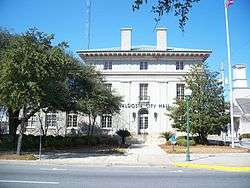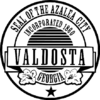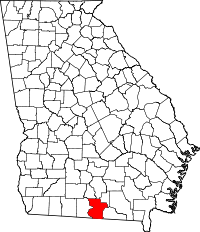Valdosta, Georgia
| Valdosta, Georgia | ||
|---|---|---|
| City | ||
|
Valdosta City Hall | ||
| ||
| Nickname(s): Azalea City, Sportstown, Titletown USA, Winnersville | ||
| Motto: "A City Without Limits"[1] | ||
 Location in Lowndes County and the state of Georgia | ||
| Coordinates: 30°50′48″N 83°16′59″W / 30.84667°N 83.28306°WCoordinates: 30°50′48″N 83°16′59″W / 30.84667°N 83.28306°W | ||
| Country | United States | |
| State | Georgia | |
| County | Lowndes | |
| Incorporated | December 7, 1860 | |
| Government | ||
| • Mayor | John Gayle | |
| Area | ||
| • City | 30.3 sq mi (78.4 km2) | |
| • Land | 29.9 sq mi (77.5 km2) | |
| • Water | 0.4 sq mi (0.9 km2) | |
| Elevation | 220 ft (67 m) | |
| Population (2010) | ||
| • City | 54,518 | |
| • Density | 1,799.3/sq mi (695.4/km2) | |
| • Metro | 139,588 | |
| Time zone | EST (UTC-5) | |
| • Summer (DST) | EDT (UTC-4) | |
| ZIP codes | 31601-31606, 31698 | |
| Area code(s) | 229 | |
| FIPS code | 13-78800[2] | |
| GNIS feature ID | 0324649[3] | |
| Website | City of Valdosta Website | |
Valdosta is a city in and the county seat of Lowndes County, located on the southern border of Georgia, United States. As of the 2010 Census, Valdosta has a total population of 54,518,[4] and is the 14th largest city in Georgia.[5]
Valdosta is the principal city of the Valdosta Metropolitan Statistical Area, which in 2010 had a population of 139,588.[6] It includes part of Brooks County to the west.
Valdosta is the home of Valdosta State University, a regional university in the University System of Georgia with over 10,900 students.[7] The local public Valdosta High School has the most winning football program of any high school in the United States.[8]
Valdosta is called the Azalea City, as the plant grows in profusion there. The city hosts an annual Azalea Festival in March.
History
Establishment
Valdosta was incorporated by European Americans on December 7, 1860, when it was designated by the state legislature as the new county seat, formerly at nearby Troupville. The railroad was built to Valdosta that year, rather than Troupville, stimulating development in the new county seat.[9] Many citizens of Troupville had already relocated to Valdosta when the Atlantic and Gulf Railroad was built four miles (about 6 km) away. On July 4, 1860, the engine known as Satilla No. 3 pulled the first train into Valdosta on the Atlantic and Gulf Railroad.
Valdosta is located in the coastal plain of Georgia and has a virtually flat landscape. It was once the center of long-staple cotton growing in the United States, a lucrative crop both before and after the Civil War. The county had a majority-white population well before the war with a substantial black population, as the cotton plantations were dependent on masses of enslaved field laborers.
The sixty miles (97 km) of railway between Valdosta and Waycross were once the longest straight stretch of railroad in the world.[10] Today highways stretch through the county for miles with hardly a curve, rise, or fall.
After being bypassed by the railroad and losing the county seat, Troupville was virtually abandoned. It had been named after Governor George Troup, for whom Troup County, Georgia, was also named. Valdosta was named after Troup's plantation, Valdosta (occasionally the Val d'Osta spelling was used for the plantation). Troup had named it after the Valle d'Aosta in Italy. The name Aosta (Latin: Augusta), refers to Emperor Augustus. A long-standing rumor held that the city's name meant "vale of beauty."[11]
The American Civil War erupted just months after the establishment of Valdosta. During the war, Valdosta was far away from battles and became a refuge for those fleeing areas of Georgia where the war was being activelly fought.
Reconstruction
After the American Civil War, during the Reconstruction era more than 100 freedmen, families of farmers, craftsmen, and laborers, emigrated from Lowndes County to Arithington, Liberia, in 1871 and 1872, looking for a better life. Since before the war, the American Colonization Society had supported the relocation of free blacks to Liberia, an American colony in West Africa established for this purpose. The first group from Lowndes County left in 1871, and were led by Jefferson Bracewell; the second group was led in 1872 by Aaron Miller.[12]
Many freedmen ended up working as sharecroppers and tenant farmers on area plantations in Lowndes County, as cotton agriculture continued well into the 20th century. As mechanization was introduced, the number of agricultural jobs decreased.
Jim Crow
In November 1902, the Harris Nickel-Plate Circus' prize elephant, Gypsy, went on a rampage and killed her trainer James O'Rourke. After terrorizing the town for a couple of hours, she ran off to Cherry Creek, north of Valdosta. Gypsy was chased by Police Chief Calvin Dampier and a posse. Gypsy was shot and killed and buried on site. James O'Rourke was buried in Sunset Hill Cemetery in Valdosta.[13][14]
On July 28, 1907, Valdosta voted to become a dry city; a record $10,000 worth of whiskey was sold on the last day. The city had been wet since its founding.[15]
Whites conducted a lynching rampage in the area of western Lowndes and eastern Brooks County in mid-May 1918, following the shooting death of Hampton Smith, a white planter with a place near Morven, Georgia. On May 16, 1918, Smith, known as a "harsh boss, frequently beating and abusing his workers"[16] was shot and killed at his house by Sidney Johnson, a black farm worker who had been mistreated repeatedly by Smith. He also shot and wounded Smith's wife, who recovered. He hid for several days in Valdosta, the county seat of Lowndes County, without discovery.
Multiple lynch mobs formed in Valdosta, including many prominent members of the town.[16] They ransacked Lowndes and Brooks counties for a week looking for Johnson and his alleged accomplices. These mobs lynched at least 13 African Americans; victims included Mary Turner and her unborn 8-month-old baby, cut from her body and murdered, and Turner's husband, lynched the day before. At least two men among the victims appear to have had nothing to do with Smith's murder or previous affairs.[16]
Sidney Johnson was turned in by an acquaintance; the Police Chief Calvin Dampier led a shoot out on the evening of May 22, 1918 at the Valdosta house where he was holed up. Following his death, a crowd of more than 700 castrated Johnson's body, then dragged it behind a vehicle down Patterson Street and all the way to Morven, Georgia, near the site of Smith's murder. There the body was hanged and burned on a tree. That afternoon, Governor Hugh Dorsey ordered the state militia to be dispatched to Valdosta to halt the lynch mobs, but they arrived too late for many victims.[16] Dorsey later denounced the lynchings, but none of the participants was ever prosecuted.
Following the violence, more than 500 African Americans fled from Lowndes and Brooks counties to escape such oppressive conditions and violence. From 1880 to 1930 Brooks County had the highest number of lynchings in the state of Georgia.[16] The lynching spree of May 1918 occurred at a time of increasing social tensions following the end of World War One. White racial violence against African Americans culminated in major riots in numerous industrial cities of the North and Midwest in Red Summer (1919), including Washington, DC; Chicago, Omaha, Baltimore and others.
By 1922 local chapters of the Ku Klux Klan, which had been revived starting in 1915, were holding rallies openly in Valdosta.[17] Before 1940 more than 1.5 million blacks left Georgia and other states of the South in the Great Migration to northern and midwestern cities to escape its Jim Crow conditions.
Changing economy
The world's second Coca-Cola bottling plant reportedly began bottling Coca-Cola in Valdosta in 1897.[18][19]
In 1899 the cotton mill town of Remerton, Georgia was established. When it was established Remerton was 2 miles (3.2 km) from the town of Valdosta. It has since become an enclave of Valdosta due to the growth of Valdosta.
In 1910, cotton was still important to the economy and Fortune magazine ranked Valdosta as the richest city in America by per capita income.[20] Soon after that, the boll weevil invaded the South, moving east through the states and killing much of the cotton crop in this area in 1917. Agriculture in this area turned to tobacco and pine timber.
In January 1913, the South Georgia State Normal College opened in Valdosta on the then edge of town. Over the course of the following century, it evolved into Valdosta State University. The school gradually became a regional center of higher education that has drawn many to the city.
On June 26, 1941 Moody Army Airfield opened 10 miles (16 km) to north-east of the town as part of the United States' preparation for the country's potential involvement in World War II. Moody Air Force Base's role in World War II and the postwar era has influenced the growth of Valdosta.
Post-World War II
The local economy received an important boost in the mid-20th century when Interstate 75 was routed and built through the area. Many vacationers on their way to Florida found Valdosta a convenient "last stop" on their way to Walt Disney World and the Orlando area. The Interstate's route to the west of the city has contributed to city's commercial district shifting from the historic downtown area to near the Interstate.
A high school oratory contest held in Valdosta in the mid-1950s is notable for its second-place winner, Martin Luther King Jr.. He later became a renowned minister and national civil rights leader.
Valdosta State College was integrated in September 1963. In 1969, Valdosta High School (the formerly all-white school) and Pinevale High School (the formerly all-black school) were merged into one system. Integration had begun at Valdosta High School about 1966.
During the Vietnam War, George W. Bush (a future president) entered the National Guard, receiving flight training at Valdosta's Moody Air Force Base in November 1968.
According to the Bureau of Labor Statistics' Monthly Labor Review, the first automated teller machine (ATM) was installed at a C&S Bank in Valdosta in 1971.[21] That ATM was preceded by one installed in Rockville Centre, New York in 1969.[22]
Valdosta was named as one of 2003's "Top 100 U.S. Small Towns" by Site Selection magazine.[23] In 2010 Valdosta was named one of the "Best Small Places For Business And Careers" by Forbes.[24]
Geography
Valdosta is located at 30°50′48″N 83°16′59″W / 30.84667°N 83.28306°W (30.846661, -83.283101).[25]
According to the United States Census Bureau, the city has a total area of 30.3 square miles (78 km2), of which 29.9 square miles (77 km2) is land and 0.3 square miles (0.78 km2) is water, for a total area of 1.09% water.
Valdosta is about 230 miles (370 km) south of Atlanta.[26] It is almost the same distance north of Orlando, Florida. It is 138 miles east of Dothan, Alabama and 137 miles west of Hinesville. Valdosta is approximately fifteen miles north of the state's border with Florida.
Climate
Valdosta has a humid subtropical climate (Köppen climate classification Cfa), with mild, dry/wet winters and hot, humid summers.[27] Temperatures frequently go over 90 degrees, but in extreme heatwaves, temperatures occasionally go over 100. Snowfall is rare but not unknown. Snow has not been sighted in Valdosta since February 2010, with the last significant snowfall being 1989. However, light frosts regularly occur between December and February.[28] Valdosta can experience Indian summers in the winter, where temperatures can get quite warm. Very rarely do winter lows go below 25 degrees Fahrenheit.
| Climate data for Valdosta, Georgia | |||||||||||||
|---|---|---|---|---|---|---|---|---|---|---|---|---|---|
| Month | Jan | Feb | Mar | Apr | May | Jun | Jul | Aug | Sep | Oct | Nov | Dec | Year |
| Record high °F (°C) | 87 (31) |
87 (31) |
93 (34) |
96 (36) |
103 (39) |
108 (42) |
104 (40) |
105 (41) |
103 (39) |
97 (36) |
92 (33) |
85 (29) |
108 (42) |
| Average high °F (°C) | 61 (16) |
65 (18) |
71 (22) |
79 (26) |
85 (29) |
90 (32) |
91 (33) |
90 (32) |
87 (31) |
79 (26) |
71 (22) |
63 (17) |
78 (26) |
| Daily mean °F (°C) | 52 (11) |
55 (13) |
62 (17) |
69 (21) |
75 (24) |
81 (27) |
82 (28) |
82 (28) |
78 (26) |
69 (21) |
61 (16) |
54 (12) |
68 (20) |
| Average low °F (°C) | 42 (6) |
45 (7) |
51 (11) |
58 (14) |
65 (18) |
71 (22) |
73 (23) |
73 (23) |
70 (21) |
59 (15) |
50 (10) |
44 (7) |
59 (15) |
| Record low °F (°C) | 3 (−16) |
2 (−17) |
18 (−8) |
25 (−4) |
40 (4) |
50 (10) |
57 (14) |
54 (12) |
42 (6) |
28 (−2) |
16 (−9) |
6 (−14) |
2 (−17) |
| Average precipitation inches (mm) | 5.79 (147.1) |
4.47 (113.5) |
5.30 (134.6) |
3.61 (91.7) |
3.15 (80) |
4.91 (124.7) |
6.30 (160) |
5.24 (133.1) |
4.11 (104.4) |
3.11 (79) |
3.24 (82.3) |
3.83 (97.3) |
47.27 (1,200.7) |
| Average snowfall inches (cm) | 0 (0) |
0.1 (0.3) |
0 (0) |
0 (0) |
0 (0) |
0 (0) |
0 (0) |
0 (0) |
0 (0) |
0 (0) |
0 (0) |
0 (0) |
0.1 (0.3) |
| Average precipitation days (≥ 0.01 in) | 9 | 8 | 8 | 7 | 8 | 10 | 13 | 12 | 9 | 5 | 7 | 8 | 104 |
| Source #1: The Weather Channel [29] | |||||||||||||
| Source #2: Weatherbase [30] | |||||||||||||
Demographics
MSA
According to the Bureau of Census, the Valdosta, Georgia Metropolitan Statistical Area (MSA) had an estimated population of 135,804 and ranked #281 in the U.S. in 2009. (The MSA consists of Lowndes, Brooks, Lanier and Echols counties.)
City
| Historical population | |||
|---|---|---|---|
| Census | Pop. | %± | |
| 1860 | 166 | — | |
| 1870 | 1,199 | 622.3% | |
| 1880 | 1,515 | 26.4% | |
| 1890 | 2,854 | 88.4% | |
| 1900 | 5,613 | 96.7% | |
| 1910 | 7,656 | 36.4% | |
| 1920 | 10,783 | 40.8% | |
| 1930 | 13,482 | 25.0% | |
| 1940 | 15,595 | 15.7% | |
| 1950 | 20,046 | 28.5% | |
| 1960 | 30,652 | 52.9% | |
| 1970 | 32,303 | 5.4% | |
| 1980 | 37,596 | 16.4% | |
| 1990 | 39,806 | 5.9% | |
| 2000 | 43,724 | 9.8% | |
| 2010 | 54,518 | 24.7% | |
| Est. 2015 | 55,724 | [31] | 2.2% |
As of the census[2] of 2010 and estimates from 2005 to 2009, there were 54,518 people, 20,280 households, and 11,876 families residing in the city. The population density was 1,521.7 people per square mile (563.9/km²). There were 22,709 housing units available in Valdosta. The racial makeup of the city was 51.2% African American, 41.5% White, 0.3% Native American, 1.7% Asian, 0.1% Pacific Islander, 1.2% from other races, and 1.9% from two or more races. Hispanic or Latino of any race were 4.0% of the population.
According to the census[2] of 2000 the largest self-reported ancestry groups in Valdosta were: · Black or African American - 51% · English - 9% · Irish - 7% · German - 6% · Scotch-Irish - 2% · Italian - 2%
There were 20,280 households out of which 27.4% had children under the age of 18 living with them, 35.5% were married couples living together, 19.3% had a female householder with no husband present, and 41.4% were non-families. 28.4% of all households were made up of individuals and 7.4% had someone living alone who was 65 years of age or older. The average household size was 2.35 and the average family size was 2.93. In the city the population was spread out with 30% 19 years of age and younger, 19.3% from 20 to 24, 23.2% from 25 to 44, 18.3% from 45 to 64, and 9.4% who were 65 years of age or older. The median age was 25.5 years. 53.1% of the population of Valdosta was female and 46.9% was male. Females 18 and over made up 54.4% of the population to 45.6% male.
The median income for a household in the city was $31,940, and the median income for a family was $39,295. Males had a median income of $33,230 versus $25,689 for females. The per capita income for the city was $19,003. About 20.3% of families and 28.2% of the population were below the poverty line, including 34.3% of those under age 18 and 13.1% of those age 65 or over.[4][33][34]
Economy
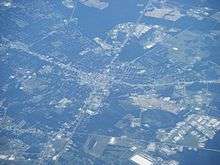
Located in the far southern portion of the state, near the Florida line along the Interstate 75 corridor, it is a commercial center of South Georgia with numerous manufacturing plants. The surrounding area produces tobacco, naval stores, particularly turpentine, as well as pine lumber, and pulpwood. According to the Georgia Department of Community Affairs, Valdosta is called the "Naval Stores Capital of the World" because it supplies 80% of the world demand for naval stores.[35][36]
In the retailing field, Valdosta has one major regional mall, Valdosta Mall, which features national chain anchor stores like JCPenney, Sears, Bed, Bath & Beyond, Buckle (store), PetSmart, Belk, Old Navy, and Ross Stores. Several large stores surround the mall or are near the mall including Best Buy, Home Depot, Kohl's, Lowe's, Office Max, Target, and Publix. Valdosta has other notable shopping areas such as the Historic Downtown area with many local businesses,[37] and the Five Points area which has a Big Lots, Winn-Dixie, and numerous national franchise and local restaurants.
Moody Air Force Base is located about 9 miles (14 km) north of Valdosta in northern Lowndes County.
Wild Adventures, a 166-acre theme and water park, is located 5 miles from Valdosta in rural Lowndes County. Wild Adventures is owned by Herschend Family Entertainment.
Education
Valdosta City School District
The Valdosta City School District holds grades pre-school to grade twelve, consisting of five elementary schools, two middle schools, and a high school. The school district serves the city of Valdosta and the surrounding communities of Lowndes County.[38] The district has 447 full-time teachers and over 7,178 students.[39]
Lowndes County School District
The Lowndes County School District holds grades pre-school to grade twelve, consisting of seven elementary schools, three middle schools, and a high school. The school district serves communities of Lowndes County outside of Valdosta.[40] The district has 592 full-time teachers and over 9,245 students.[41]
Private education
Valwood School is an independent college preparatory school enrolling students in Pre-Kindergarten through twelfth grade.[42] Several Christian Schools offering classes K-12 also operate in and near Valdosta including Georgia Christian School, Lighthouse Christian School, Open Bible Christian School, Highland Christian School, St. John Catholic School, and Victory Christian School.
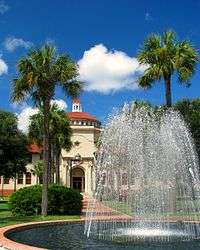
Higher education
Valdosta is also the home of Valdosta State University[43] (VSU), founded in 1906 as South Georgia State Normal College for Women. It became part of the University System of Georgia in 1950 as Valdosta State College. Valdosta State College achieved university status and became VSU in 1993 and is one of two regional universities in Georgia. VSU has seen substantial growth in the past decade and currently has an enrollment of over 13,000 students. VSU is also the site of the Georgia Governor's Honors Program (GHP), a yearly four-week gathering of meritorious high school students in subjects ranging from standard academic subjects (i.e. math, languages, social studies, etc.) to broader intellectual enterprises (i.e. dance, theater, agricultural sciences.)
An extension of Georgia Military College[44] is in the city limits, and Wiregrass Georgia Technical College[45] is located a mile outside of the city limits off of Interstate 75.
Also located in Valdosta is Embry-Riddle Aeronautical University-Worldwide: Moody Campus.[46]
Infrastructure
Major highways
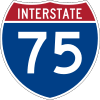 Interstate 75 (State Route 401) runs north to south through a western section of Valdosta.
Interstate 75 (State Route 401) runs north to south through a western section of Valdosta. U.S. Highway 41 (State Route 7) runs north to south entering the city at the Withlacoochee River being known as North Valdosta Road, it continues south on North Ashley Street. It branches into two sections at Five Points, US 41 Business / SR 7 Business traveling south down North Ashley Street, US 41 Alternate / SR 7 Alternate traveling south down Patterson Street. At the overpass over the CSX railroad, they join together to become US 41 Business / SR 7 Business following South Patterson Street.
U.S. Highway 41 (State Route 7) runs north to south entering the city at the Withlacoochee River being known as North Valdosta Road, it continues south on North Ashley Street. It branches into two sections at Five Points, US 41 Business / SR 7 Business traveling south down North Ashley Street, US 41 Alternate / SR 7 Alternate traveling south down Patterson Street. At the overpass over the CSX railroad, they join together to become US 41 Business / SR 7 Business following South Patterson Street.  U.S. Highway 84 (Wiregrass Georgia Parkway) is colocated with State Route 38 and runs west to east bisecting the city and is known as Hill Avenue through the city limits.
U.S. Highway 84 (Wiregrass Georgia Parkway) is colocated with State Route 38 and runs west to east bisecting the city and is known as Hill Avenue through the city limits. U.S. Highway 221 follows US 84 and SR 38 west of Valdosta and State Route 31 northeast of Valdosta.
U.S. Highway 221 follows US 84 and SR 38 west of Valdosta and State Route 31 northeast of Valdosta.
Other transportation
The Valdosta Regional Airport, three miles south of Valdosta, is serviced by Delta Air Lines to Hartsfield-Jackson Atlanta International Airport and Atlantic Southeast Airlines as a Delta Connection. There is also a Greyhound bus station.
Streetcar
In 1898, the Valdosta Street Railway Company secured the right to operate street cars on Patterson, Ashley, Toombs, Lee, Hill, Central, Crane and Gordon Streets. Valdosta was one of the smallest cities in America to have a street railway system. The streetcar operated in the downtown area between 1899 and 1924. The abandoned tracks were removed in the 1940s to be used as scrap metal for the war effort.[47]
Museum
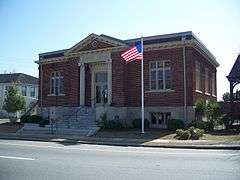
The Lowndes County Historical Society & Museum is located at the Carnegie Library of Valdosta, a National Register of Historic Places listed building and Carnegie library,[48] one of 24 Carnegie Libraries in Georgia.
LGBTQ Community
The South Georgia Pride Festival is held every third Saturday in September. This festival is for the LGBTQ Community and their allies in the Valdosta and surrounding counties. The first festival was held in 2008 on the front lawn of Valdosta State University, hosted by the VSU Gay Straight Alliance. It was called a day to celebrate diversity. In 2009 the festival became South Georgia Pride and held its festival at the John W Saunders Park in Valdosta in 2010. The Valdosta Mayor John J. Fretti proclaimed September 17, 2011 as South Georgia Pride Day.[49] In 2011 the organization became a 501c3 Non Profit. Since 2010 the festival has grown to over 3,000 people attending. The day is filled with music,entertainment, free HIV testing, and vendors. In July 2012 Mayor John Gayle refused to give a Proclamation to South Georgia Pride. Their Proclamation was the only one he has refused.[50][51]
Sports
High school football
Valdosta has a strong high school football tradition. The Valdosta High School Wildcats have one of the most successful high school football programs in the country with 867 wins, six national championships (1962, 1969, 1971, 1984, 1986, 1992), 24 Georgia state championships between 1920 and 1998, and 41 region titles.[52]
Cross-town rival Lowndes High School have also built a strong program, winning five state titles since 1980 (including 1999, 2004, 2005 and 2007).[53]
Local private school, Valwood School has won five GISA state football titles in Class A (1985, 1986, 1999), Class AA (2012) and Class AAA (2015).[54]
The annual matchup between the two public high schools, Lowndes and Valdosta High, is known as the Winnersville Classic.[55] Valdosta leads the overall series 34-16 and 19-12 since 1981 when the annual match was named the Winnersville Classic.
Valdosta State University
Football
The Valdosta State University Blazers have won a total of three Division II National Championship titles (2004,2007 and 2012) and have also have won 6 Gulf South Conference football championships (1996, 2000, 2001, 2002, 2004, 2010).
Tennis
Valdosta State University's Men's Tennis team won the 2006 and 2011 NCAA Division II national championships.[56] The team has also appeared in the national title game in 2004, 2007, and 2010.
Valdosta State's Men's Tennis team leads the Gulf South Conference with nine conference championships (1996, 2000, 2001, 2004, 2007, 2008, 2009, 2010, 2011).[57] In 2011 the men's team became the first to win five consecutive GSC Championships in tennis.[58]
Baseball
The first baseball team at Valdosta State was formed in 1954 and had its first official season of intercollegiate competition in 1955. Tommy Thomas, became coach in 1967 and served as coach until 2007. Under Thomas, the Blazers saw 34 winning seasons, two conference titles, three Divisional titles, eight trips to the national tournament, and a Division II national championship in 1979. Thomas is the all-time wins leader in NCAA Division II baseball with 1302 wins. Greg Guilliams became VSU's head baseball coach in 2008 and won a Gulf South Conference East Division title in his first year and led Valdosta State to its first postseason appearance in seven years.[59]
In 1915 the Newark Peppers of the now defunct Federal League held spring training in Valdosta.[60]
Minor League Baseball
Valdosta hosted several different minor league baseball teams during the twentieth century, and was one of six cities in the Georgia State League which began play in 1906, with the team known as the Valdosta Stars.[61][62] From 1946-1958, the Valdosta Tigers were a "Class-D" minor league team. Valdosta was also home to the Valdosta Trojans which was a "farm" team for the Brooklyn Dodgers.
ESPN's Titletown, USA
TitleTown USA was a month-long segment on ESPN that started in the spring of 2008 and continued through July. Fans nominated towns and cities across the country based on their championship pedigree. A panel reviewed the nominees and fan voting in May determined the 20th finalist. SportsCenter visited each city in July, and fan voting July 23–27 determined the winner.
Due to the Valdosta High School football team's record as well as multiple championships in many sports by Valdosta State University, Lowndes High School, Valwood School, Georgia Christian School, and other academic institutions in the town, Valdosta was nominated as a finalist in 2008 for ESPN's "Titletown USA" contest. On July 28, 2008, with 29.2% of fan votes on ESPN's website poll, Valdosta was named TitleTown USA.[63]
Media
Newspaper
Radio
AM:
- WJEM 1150 AM; 5 kW Gospel
- WVLD 1450 AM; 1 kW Sports Radio
- WGUN 950 AM; 4 kW Adult Urban Contemporary
- WRFV 910 AM; 50 kW
FM:
- WDDQ TALK 92.1 FM Talk radio
- WAYT 88.1 FM Christian Contemporary (licensed to Thomasville)
- WVVS 90.9 FM VSU station
- WWET 91.7 FM
- WAAC 92.9 FM Country
- WJYF 95.3 FM Christian Contemporary
- WQPW 95.7 FM Adult Contemporary
- WJEM 96.1 (repeater of 1150 AM)
- WGOV-FM 96.7 FM Urban
- WAFT 101.1 FM Christian
- WXHT 102.7 FM Pop Hits (Broadcast from Valdosta but licensed to Madison, Florida)
- WSTI 105.3 FM Classic Soul and R&B (Broadcast from Valdosta but licensed to Quitman)
- WWRQ 107.9 FM The Beat
Television
Valdosta and Lowndes County is part of the Tallahassee, Florida television market and receives most channels from that city; it also receives some channels from the neighboring Albany market. See Template:Tallahassee TV and Template:Albany GA TV.
- WSWG channel 44 is the local CBS affiliate licensed to Valdosta and based in Moultrie, programmed by WCTV in Tallahassee. The station serves the Valdosta and Albany areas, and includes subchannels offering programming from MyNetworkTV, Me-TV and The CW.
- WXGA-TV channel 8 is the local GPB outlet, licensed to Waycross.
Notable people
Entertainment
Sports
Politics
|
Valdosta in fiction
- Parts of Fannie Flagg's novel Fried Green Tomatoes at the Whistle Stop Cafe and the 1991 film based upon the novel are set in Valdosta.
- In Allen Steele's science fiction novel Coyote Frontier, Valdosta in the year 2070 is the site of Camp Buchanan, an internment camp for dissident liberal intellectuals.
- Scenes from Ernest in the Army take place in Valdosta, even though the entire film was shot in South Africa.
- Scenes from the film Zombieland, starring Woody Harrelson, were shot on Valdosta streets and at nearby Wild Adventures theme park.[68]
- In Cotton Patch Gospel, Joe moves Jesus and the rest of the family to Valdosta when Herod dies.
- The Lady Chablis performed in Valdosta in the novel Midnight in the Garden of Good and Evil by John Berendt.
- The 1986 movie As Summers Die starring Bette Davis and Jamie Lee Curtis was filmed in Valdosta.
- In John Steinbeck's novel East of Eden, Adam Trask stops in Valdosta to steal supplies and request money from his brother Charles after escaping from a Florida chain gang on his way back to Connecticut.
References
- ↑ "City of Valdosta Website". City of Valdosta Website. Retrieved September 5, 2012.
- 1 2 3 "American FactFinder". United States Census Bureau. Retrieved 2008-01-31.
- ↑ "US Board on Geographic Names". United States Geological Survey. 2007-10-25. Retrieved 2008-01-31.
- 1 2 "Valdosta (city) QuickFacts from the US Census Bureau". Quickfacts.census.gov. Retrieved January 13, 2014.
- ↑ "American FactFinder". Factfinder2.census.gov. 2010-10-05. Retrieved September 6, 2012.
- ↑ "American FactFinder". Factfinder2.census.gov. 2010-10-05. Retrieved September 6, 2012.
- ↑ http://www.valdosta.edu/administration/institutional-research/documents/enrollment-graduation-retention/spring-2015-enrollment-update.pdf
- ↑ National High School Sports Record Book Archived March 17, 2009, at the Wayback Machine.
- ↑ "Valdosta | Georgia.gov". Valdosta.georgia.gov. Retrieved September 6, 2012.
- ↑ "Valdosta Georgia". History. Retrieved September 6, 2012.
- ↑ Poling, Dean (2009-10-12). "What does Valdosta mean?". The Valdosta Daily Times. Retrieved November 4, 2011.
- ↑ Eric Dewayne Jackson (2003). "Lowndes County Georgia List of Emigrants to Arithington, Liberia". Retrieved 8 January 2008.
- ↑ "Gypsy". The New Georgia Encyclopedia. Retrieved December 31, 2007.
- ↑ "Elephant Kills Keeper" (PDF). The New York Times. 1902-11-24. Retrieved January 13, 2014.
- ↑ "Valdosta's Bars Are Now Closed". Atlanta Constitution. Atlanta, Georgia. 29 July 1907.
- 1 2 3 4 5 Meyers, Christopher C (2006). "" Killing Them by the Wholesale": A Lynching Rampage in South Georgia". The Georgia Historical Quarterly. JSTOR. 90 (2): 214–235. Retrieved 14 May 2013.
- ↑ "Remembering Mary Turner". Maryturner.org. 1918-07-10. Retrieved 2016-07-13.
- ↑ Jessica Pope (2007-09-29). "A trip through time". The Valdosta Daily Times. Retrieved January 1, 2008.
- ↑ Billy Bruce (2007-12-22). "Breathing fresh life into Downtown". The Valdosta Daily Times. Retrieved January 1, 2008.
- ↑ "Triple Crown Hometowns". Archived from the original on 2007-10-21. Retrieved January 8, 2008.
- ↑ Teresa L. Morisi (August 1996). "Commercial banking transformed by computer technology" (PDF). Monthly Labor Review. Archived from the original (PDF) on 2011-10-22. Retrieved January 13, 2014.
- ↑ Kirkpatrick, Rob (2009). 1969: The Year Everything Changed. Skyhorse Publishing Inc. p. 266. ISBN 9781602393660.
- ↑ Ron Starner (March 2004). "The Road to Boomtown". Site Selection. Retrieved January 13, 2014.
- ↑ "#79 Valdosta GA". Forbes. 2010-04-14. Archived from the original on 2010-04-20. Retrieved January 13, 2014.
- ↑ "US Gazetteer files: 2010, 2000, and 1990". United States Census Bureau. 2011-02-12. Retrieved 2011-04-23.
- ↑ CNN Staff. "Family demands coroner's inquest in teen's gym mat death", CNN. October 22, 2013. Retrieved on October 22, 2013.
- ↑ Climate Summary for Valdosta, Georgia
- ↑ First and Last Frost Dates in Georgia 1997-2007 University of Georgia College of Agricultural and Environmental Sciences
- ↑ "The Weather Channel: Monthly Avearges". The Weather Channel. Retrieved 2010-07-27.
- ↑ "Historical Weather for Valdosta, Georgia, United States". Weatherbase. Retrieved 2010-07-27.
- ↑ "Annual Estimates of the Resident Population for Incorporated Places: April 1, 2010 to July 1, 2015". Retrieved July 2, 2016.
- ↑ "Census of Population and Housing". Census.gov. Retrieved June 4, 2015.
- ↑ "American FactFinder". Factfinder.census.gov. Retrieved September 6, 2012.
- ↑ "American FactFinder". Factfinder2.census.gov. 2010-10-05. Retrieved September 6, 2012.
- ↑ "Georgia Department of Community Affairs' Data for Valdosta". Retrieved July 28, 2008.
- ↑ ""Faces in the Piney Woods": A History of Turpentine, Valdosta State Archives and Special Collections". Retrieved December 12, 2014.
- ↑ "Downtown Valdosta, GA". Valdosta Main Street. Retrieved September 6, 2012.
- ↑ Georgia Board of Education, Retrieved June 23, 2010.
- ↑ School Stats, Retrieved June 23, 2010.
- ↑ Georgia Board of Education, Retrieved June 23, 2010.
- ↑ School Stats, Retrieved June 23, 2010.
- ↑ "Valwood School - About Valwood". Valwood.org. Retrieved September 6, 2012.
- ↑ Valdosta State University, Retrieved June 23, 2010.
- ↑ Georgia Military College- Valdosta Campus, Retrieved June 23, 2010.
- ↑ Valdosta Technical College. Retrieved June 23, 2010.
- ↑ "Embry-Riddle Worldwide". Retrieved January 13, 2014.
- ↑ Lowndes County Historical Society and Museum
- ↑ "Valdosta Museum and Lowndes County Historical Society". Valdostamuseum.org. Retrieved September 6, 2012.
- ↑ "Valdosta Mayor Proclaims Sept 17 as "South Georgia Pride Day"". Georgia Voice. September 16, 2011.
- ↑ "Valdosta mayor refuses to sign South Georgia Pride proclamation". Georgia Voice. July 25, 2012.
- ↑ "Pride denied: Valdosta mayor denies LGBT event proclamation". Valdosta Daily Times. July 27, 2012.
- ↑ Archived November 7, 2011, at the Wayback Machine.
- ↑ "Lowndes Football History". Lowndesfootball.com. Retrieved September 6, 2012.
- ↑ "GISA Stats Your Source for GISA Sports". Gisastats.com. Retrieved September 6, 2012.
- ↑ "The History of the Winnersville Classic » Local Sports". Valdosta Daily Times. Retrieved September 6, 2012.
- ↑ "NCAA Division II Men's Tennis Championship Bracket". NCAA.com. Retrieved September 6, 2012.
- ↑ "Gsc Men's Tennis Championship Team" (PDF). Retrieved September 6, 2012.
- ↑ "Valdosta State - Blazers Claim Fifth Consecutive GSC Championship". Vstateblazers.com. Retrieved September 6, 2012.
- ↑ Archived February 26, 2012, at the Wayback Machine.
- ↑ The ESPN Baseball Encyclopedia. Sterling Publishing. 2007. p. 1789. ISBN 1-4027-4771-3.
- ↑ "New Georgia Encyclopedia: Minor League Baseball". Georgiaencyclopedia.org. 2005-03-17. Retrieved September 6, 2012.
- ↑ "Valdosta, Georgia Minor League History". Baseball-Reference.com. Retrieved September 6, 2012.
- ↑ "ESPN names Valdosta TitleTown USA". Archived from the original on 2008-08-01. Retrieved January 13, 2014.
- ↑ "Tuskegee Airmen". CommunityWalk. Retrieved September 6, 2012.
- ↑ We Are Marshall (2006) - IMDb
- ↑ "Marshall University - Huntington, WV". Marshall.edu. Retrieved September 6, 2012.
- ↑ "Stan Rome NFL Football Statistics". Pro-Football-Reference.com. 1956-06-04. Retrieved September 6, 2012.
- ↑ Dean Poling (February 26, 2009). "Zombieland: Psst! There's a movie in town". Valdosta Daily Times. Retrieved March 5, 2009.
External links
| Wikimedia Commons has media related to Valdosta, Georgia. |
| Look up Valdosta in Wiktionary, the free dictionary. |
- Valdosta New Georgia Encyclopedia

Wikivoyage has a travel guide for Valdosta. - City of Valdosta Website Portal style website, Government, Business, Library, Recreation and more
- City-Data.com Comprehensive Statistical Data and more about Valdosta
- South Georgia Historic Newspapers Archive Digital Library of Georgia
Template:Georgia
